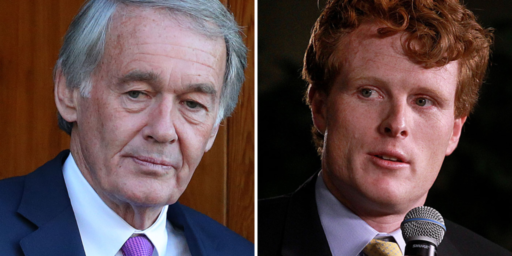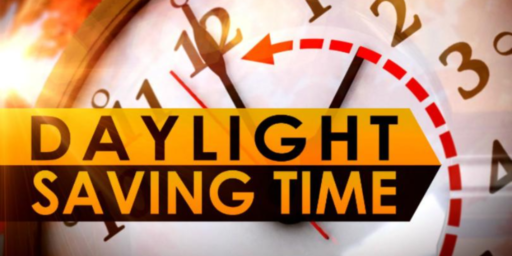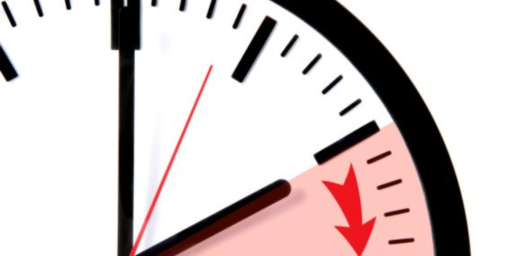More Daylight Savings Time
Congress is extending Daylight Savings Time an extra month as part of a goliath energy bill.
More Daylight Savings: Energy Boon or Scheduling Snafu? (National Geographic)
This week the U.S. Congress is expected to pass a mammoth new energy bill that includes subsidies to oil and gas companies and encourages nuclear power. Yet the bill’s most controversial aspect may be its monthlong extension of daylight saving time. The move’s energy-saving potential is uncertain. So few data exist on the subject that the plan calls for a new energy-impact study to be commissioned after the proposal becomes law—but before clock changes would actually take effect in 2007. The bill calls for daylight savings to begin three weeks earlier, on the second Sunday in March, and to end on the first Sunday in November, one week later than daylight saving time currently does.
Advocates such as Massachusetts Democrat Ed Markey, who is co-sponsoring the bill in the House of Representatives, say the plan is about more than just saving energy. “In addition to the benefits of energy saving, less crime, fewer traffic fatalities, more recreation time and increased economic activity, day light saving just brings a smile to everybody’s faces,” Congressman Markey said in a press statement.
Frankly, I wish they’d just cancel Standard Time and switch to Daylight Savings Time year round. I always prefer more light late in the evening to less light. Any economic or other social benefit that would also occur is just gravy.
Still, not everyone will be happy.
Proposed Change To Daylight Savings Time Could Affect IT (Information Week)
“Spring ahead, fall back.” That’s a phrase familiar to most Americans–but when to do those activities is about to change. Congress is on the verge of passing an energy bill that will lengthen daylight-saving time by about a month. If that happens, IT people may end up spending some of those extra hours fixing nits in their computer infrastructures.
Many computers, operating systems and applications contain code that automatically records the date and time of events or keystrokes. These programs often are set to make an adjustment to DST, just as they were set to record the year in only two digits, thus creating the Y2K mess. The daylight-saving problem will not be as nasty as Y2K but still could mean some extra work.
Not all computing devices require the exact time, but if clocks are not corrected, log files may be off by an hour. Many systems that make the automatic adjustment for DST will have to be patched. If a vendor doesn’t offer a patch, you’ll have to set the clock manually, just like you did in the 1970s. A better solution is to use a network time server, which will update the clocks on all your systems, correct for clock drift and take care of any future changes to the DST standard automatically.
I remember how arduous it was to change the clocks back then. Sometimes, it required the expenditure of 30 seconds or more effort.





Frankly, I wish they’d just cancel Standard Time and switch to Daylight Savings Time year round.
Or just cancel Daylight Savings Time, and schedule all our activities an hour later in the day.
I’m not sure how all of our appliances that automatically adjust for DST do so; they all have internal calenders. I can easily see that they’re going to “fall back” too early, so I’ll have to step them forward, and then a week later step them back, and come spring, set them forward, wait for them to be set forward again, and then set them back. Not a happy or useful improvement.
We should abolish DST. If people are to come to work earlier or later, change their starting time, don’t muck with the clocks.
I always prefer more light late in the evening to less light.
Depends on where you live. If you live far enough South, you tend to prefer less light in the evening in the summer. In the height of summer, after sundown is the most pleasant time to be outside.
Also, many of us prefer waking up to light rather than darkness.
Well, I for one would prefer no flip-flopping – it’s just silly. As far as clock-changing efforts go, at one time I was data center manager for a large area hospital: going forward was no problem – just a missing hour’s worth of timestamps.
But setting them back required quiescing the lab and admissions systems for an hour, so that test results & admits did not “stomp” over already-processed transactions with the same date & time.
Probably better software would have handled that better, but it’s what we had to work with. In a similar vein, I’d suppose other systems would have had problems with a duplicated hour: how about packages shipped out 50 minutes BEFORE they were packed? or trains, buses and trucks departing terminals an hour before they arrived? Could confuse things somewhat!
🙂
How did we live before LBJ (or was it Nixon) put Day Lights Savings time in affect? The fuel company wanted it because they knew that the public would be out driving if they had more light after work. We should be on 1 standard time no mater what time it is.
I can’t stand daylight savings time. I just wish they’d leave it ONE time all the time, either way doesn’t matter.
They’ve already bumped DST up several times, as well. They might as well make it year-round.
People who don;t like daylight savings time are idiots. Hey shit for brains, who like having the sun rise at 4:00 AM in the summer, and set at 4:00 Pm in the winter?
Hey shit for brains, who like having the sun rise at 4:00 AM in the summer, and set at 4:00 Pm in the winter?
Some of us don’t like that, and hence don’t live so far north. You can’t do much about the fact that there’s more sunlit hours in the summer and fewer in the winter, and that the effect is exaggerated when you get closer to the poles.
The sun rising very late in the winter isn’t a lot of fun either.
People who don;t like daylight savings time are idiots. Hey shit for brains, who like having the sun rise at 4:00 AM in the summer, and set at 4:00 Pm in the winter?
More of the reasoned debate we’ve come to expect.
Here’s a suggestion: take 30 minutes from each and leave the time ALONE! It’s not like it’s making a huge difference either way for those of us who live in sensible temperate areas where it doesn’t snow every week of the winter.
Uh, yeah, James, 30 seconds PER COMPUTER. If you had the number of computers of say, a General Motors, Federal Express, or some other major corporation, it would definately be time consuming.
My wife works for a government agency that operates 24/7, collecting data and issuing reports at all hours. They get around the DST problem you described by simply using Zulu time for such things — which doesn’t spring forward or fall back.
The work schedules adjust, but not the data timestamps.
What about the many many thousands of young school kids that would have to travel to school in the darkness.
Several years ago, they tried the same thing (extending DST) and there was such an outcry from parents, it was abandoned.
Not only that, this idea comes from a Mass. Democrat. That should send a message to everyone.
Well, it seems to me, as an old-dog mainframe programmer, no matter what is done it will impact the entire computer world. With that in mind, why not just abolish time changes altogether. I’d prefer keeping daylight savings time year-round myself.
Let’s see… 30 seconds per machine where I work translates to… 54.1666 man-hours four times a year. Gee, thanks. Good to know it’s such a minor thing. And that’s not counting the telephones or the actual wall clocks. Thankfully, we’ve got a server that sets the time for the PCs, phones, and T&A system. My point? Just because it’s a minor thing on a personal scale, doesn’t mean it won’t be a big hairy deal for folks out in the real world. For example, the Nachi worm forced infected PCs to patch themselves against the exploit it used. No big deal for a home user, right? You needed that patch anyway. However, once some half-wit brought an infected machine into our system, we had 5000 PCs try & patch themselves at once, crashing our routers.
The simple issue of keeping the clocks set properly is an issue, but not the only issue. In my business we have many systems which are constantly converting UTC (or GMT) into local time. All of these conversion routines must be re-written to account for the new DST rules. And what’s even hairier is that the systems must remember the old rules also. If we are working with data from 2 years back, our systems have to know that there was a different DST rule in place at that time. It really becomes a mess, and it is unnecessary.
Personally, I like having more daylight at the end of the day. I’m not for abolishing DST or making it year round or anything. Just PICK A RULE AND STICK TO IT is all I ask. This is our calendar you’re jacking with.
I heard that daylight time was being extended & as I sell astrological calendars & as these calendars time celestial events in US standard time & as the time used is adjusted for daylight, I needed to know if 2006 calendars, which have already been calculated & printed, would be out of date by the time they arrived. Eg, was the change to take effect this year or next year. So I googled the matter & arrived here.
Where you live in the country does affect how you view daylight time. When I heard about the 3 week extension, my first thought was that it would fail & ultimately be repealed. Here is why:
The further north or south of the equator you are, the longer days are in summer & the shorter they are in winter. It makes sense to advance the clock in New York. It makes no sense to advance it in Miami. Or Hawaii, which does not observe daylight at all. In tropical climes, daylight merely shifts sunrise from 6 am to 7 am, and sunset from 6 pm to 7 pm. Big deal. From blinding sunshine to total darkness is a matter of maybe five minutes.
It also makes a difference where in the time zone you live. Time zones are 15-ish degree chunks of longitude. Time in a time zone is actually correct only for the degree of longitude it’s calculated for. Eg, for the continental US, 75 (Philly), 90 (Chicago), 105 (Santa Fe) & 120 (San Francisco) degrees. If you’re in the western end of the time zone, your time is already, by definition, 30 minutes fast. But things get worse. The western limits of both eastern & central time are generally further west than they should be, which means that many locations in the western fringes of the eastern & central time zones are some 45 minutes fast – and that’s their standard time. Add an hour for daylight, extend the program by 3 more weeks, consider the south-west quadrant, and I would not be surprised if this splits Georgia, Indiana & Michigan in two. Those three states in particular have had problems in the past.
The history of time zones & time changes are given in Thomas Shanks’s The American Atlas (ACS, 5th edition, 1990). It’s a boring, oversize, 617 page compilation of reference tables in tiny, tiny type, but close study of it will reveal many things.
Simple solution for all you IT guys and regular PC users. Do what I did years ago. Set your time zone to Arizona, which does not have DST. Then manually change your clock when DST begins and ends. No more back and forth maneuvering.
See, think simple.
I think they were hoping we would focus on DLST and forget that nothing was done for gas prices at the pump…
I think Daylight Saving year round might be a good move. For me any extension of Daylight Saving Time is a plus.
For the most part, I cannot understand those that have such a problem with DST. I don’t think we are going to see children being run over by morning school busses anymore than we would see dead children being picked up from daycare or extra curricular activities at the end of the day.
I can understand someone living in Death Valley, or the desert of southern Arizona preferring the cool down darkness at night over the sun. However, for most places, I just can’t buy it. Its hot here in the summer too — usually mid 90’s and humid, but the temperature doesn’t drop that much for hours after dark. One hour isn’t going to cool it off that much because of the humidity. Plus it seams as though the mosquitoes prefer the darkness – let them have it.
I’ve always loved Daylight Saving time even as a child. I’m wide and alert in the morning. I can handle driving to work in the dark. However, when I’m done working for the day I am TIRED. I don’t want to have to compete with everybody else who is tired and in a rush to get back home and with their families. It’s also nice that when you get home you can go outside or even look out the window from the comfort of your air conditioned home and see what sunlight is left of the day belongs to you and not your employer.